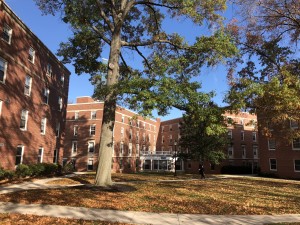
Simmons College is reviewing proposals from developers to redevelop its 886,000-square-foot Fenway campus with the goal of modernizing its dorms and building a new science building to support its updated curriculum.
Opportunities to acquire nearly 6 acres in Harvard Square and to redevelop Simmons College’s campus in the Fenway are setting off a spirited competition among developers and potential future institutional users.
More than 20 groups have toured the Episcopal Divinity School’s Brattle Street campus in Cambridge, where a sale would resolve 10 years of uncertainty about the property’s future.
And Simmons College is narrowing a list of proposals from developers to reshape its residential and academic campuses in the Fenway, with the goal of building a new science building and modernizing its aging dorms.
While higher education institutions usually take a deliberative approach to their real estate decisions, Greater Boston’s spiraling property values are giving colleges more incentive than ever to extract profits.
“There’s not a school in the city that isn’t always thinking about how they can optimize their real estate holdings, usually by looking for opportunities to reinvest in their facilities while monetizing surplus property,” said Michael Greeley, a managing director at Newmark Knight Frank.
Another School Could Be Buyer
The Cambridge-based Episcopal Divinity School relocated to New York City this fall after agreeing in February to affiliate with Union Theological Seminary.
That left behind a dozen buildings on its institutional campus ranging from a chapel to offices, and a 15-room mansion previously used as the school president’s home. An adjacent 1.3-acre site could be suitable for residential development, said Sandy Tierney, an executive vice president for Boston-based McCall & Almy which is marketing the property.
The divinity school sought in 2007 to shore up its finances by selling the campus but was unable to find a suitable relocation spot, Tierney said. It ended up partnering with Lesley University, which was looking for more dorm and administrative space. Lesley acquired 7.5 buildings in a condominium structure, including a 50 percent interest in the 52,000-square-foot Sherrill Hall, containing a library, classrooms and offices. Lesley University has a right of first offer on the portions of the property it doesn’t already own, Tierney said.
Condo documents stipulate that the campus be used for religious, educational or related uses.
“These are unlikely to become commercial properties with office tenants. It’s more likely that an institutional user owner-occupier will purchase the property,” he said.
Those restrictions and Lesley’s right of first offer, however, don’t apply to a 1.3-acre contiguous parcel at 8-15 St. John’s Road containing six residential buildings that had been used for faculty and student housing. That parcel could be suitable for residential development, Tierney said. The land is zoned for single-family homes with minimum 6,000-square-foot lot sizes.
Since beginning the formal marketing process in September, McCall & Almy has conducted more than 20 property tours.
“There’s a great deal of interest and we’re expecting we’ll have multiple proposals,” Tierney said. A bid deadline is expected to be set later this month.
Wedged between the Fenway’s booming development scene and the Longwood Medical Area life science cluster, Simmons College is reviewing proposals from developers to partner on updates to its academic and residential campuses.
Trustees authorized a real estate planning initiative last winter. The college owns a five-building, 552,000-square-foot academic campus at 300 The Fenway and a 13-building residential campus a block away at 54 Pilgrim Road.
The college has narrowed the proposals from developers down to a short list, according to a source familiar with the process. While Simmons has announced that it’s not contemplating the sale of any of its properties, proposals could involve the ground-lease of buildings to developers, the source said.
That was the structure under which Boston-based developer Related Beal acquired Boston University’s nine-building Kenmore Square portfolio last year. Related Beal has yet to submit its redevelopment plans.
According to informational letters sent by Simmons to the community, options include from demolishing and replacing the 45-year-old Park Science Center, or moving science classes to another academic building and redeveloping the site for other uses.
Simmons also seeks to modernize its nine dorms, all of which were built between 1905 and 1961, to compete with other colleges’ ritzy new residential buildings. Across the street at 300 Brookline Ave., Emmanuel College is constructing a 19-story residential tower designed to support “apartment-style living” with such perks as student lounges, a convenience store and penthouse-level function room.
“In order to keep pace, we need to complement our classic, traditional residential campus with more suites, common areas and other features … that we know prospective students are looking for when they are selecting a college,” Simmons President Helen Drinan wrote in an open letter to the college community.
While no timetable has been released, Simmons renewed its institutional master plan with the Boston Planning and Development Agency for two years in March, which suggests the earliest that a project would begin would be 2019. The agency requires colleges to spell out their real estate plans for 10-year periods and file amendments if there are changes.




 |
| 



